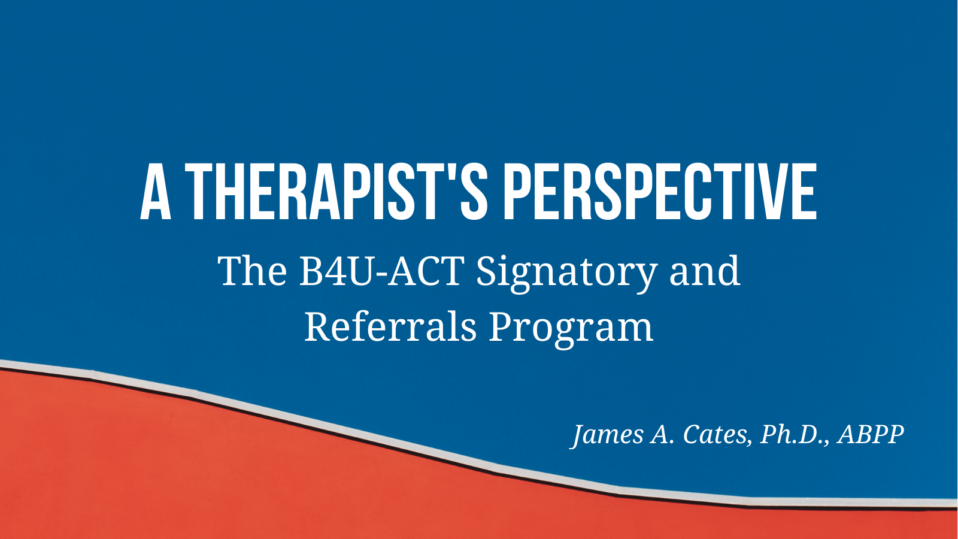This article was originally published as part of our Spring 2021 Newsletter. Click here for the full issue.
The B4U-ACT Referral Service: A Therapist’s Perspective
James A. Cates, PhD., ABPP
The B4U-ACT referral service relies on counselors who have been vetted and approved to offer services to MAPs requesting help. But what skills are needed to become a mental health provider (MHP) for a MAP? No doubt there are as many answers as there are MHPs offering services. Two warning labels attach to this article. First, at b4uact.org, a tab labeled “For Therapists” has excellent information for MHP involvement with the organization, with much more specificity than I provide. Second, this list is based on my experience counseling sexual minorities (including MAPs), those who have sexually offended, and those who have been the victims of sexual offenses. With that in mind, consider the following essential criteria:
1. Comfort with one’s own sexuality. As we mature and life circumstances change, perceptions of our sexuality, sexual orientation, and intimacy evolve. A willingness to challenge and be challenged by these internal changes is essential for the MHP who intends to serve the minor-attracted population.
2. Discerning the difference between respecting and accepting the views of others. MAPs seeking care through B4U-ACT know that the organization strives to protect children. Still, there are differing views on how a child can be harmed. If a client respects the law, the goal of the MHP is not to change these views. In a broader context, MHPs meet with clients whose viewpoints are routinely set aside for the therapy hour. Differing views on religious beliefs or politics never become an issue. In contrast, boundaries with children becomes a focal point of treatment for a MAP. Therapists must respect differences of opinion, even when they do not accept the viewpoint of the client.
3. A corollary to this principle is the ability to stand among the trees and still see the forest. MAPs who feel safe with their MHP might report longings and desires demonstrated in overt behaviors. Whether these behaviors place a minor at risk can be open to interpretation. MAPs overcome tremendous fear to meet with a professional. The MHP who too readily reads abuse into any suspect behavior, rather than rationally considering context, intent, and the applicability of reporting laws, risks victimizing the client.
4. An understanding of the differences between MAPs and those who sexually offend. Not all persons who sexually offend are MAPs, and not all MAPs sexually offend. There are multiple reasons that a person can engage in a sexual offense, and not all sexual offenses target minors. MAPs identify as attracted to younger persons, of varying ages. Treatment interventions for those who sexually offend may be appropriate for MAPs who have engaged in illegal sexual behavior. For those who have not offended, however, there is no evidence that such treatment is beneficial. In addition, treatment for sexual offending is targeted specifically to reduce the risk of re-offense. It does not address the broader spectrum of minor attraction as a sexual orientation.
5. Capability to empathize with both victims of sexual abuse, and people who identify as MAPs. MHPs are aware of the frequency of sexual abuse against children. Because people identify as minor-attracted, it does not exempt them from the potential to have experienced unwanted, and even traumatic sexual acts perpetrated upon them in childhood. If so, they need support to explore the impact of abuse on their perceptions of sexuality and intimacy, every bit as much as persons with other orientations.
6. A willingness to educate both fellow professionals and the public about MAPs. Pervasive prejudices and stereotypes mean that mental health providers who offer treatment must also function as advocates. Erving Goffman has said, “Stigma is the process by which the reactions of others spoils normal identity.” Many MAPs, especially those whose orientation is a closely guarded secret, live in the shadows, fearful that they will be outed and despised by those with whom they interact. Only in demonstrating solidarity and support can we further affirm their worth.
The MHP whose skill set includes the ability to work with MAPs is much-needed. I do not fault those whose skills fall outside this population. (Over the years, I have found my limits. For example, there have been periods when I was determined to learn the art of play therapy, diving into books and workshops, only to find myself once again thoroughly enjoying playing with a child, with no clue what therapeutic benefit we were achieving.) Every MHP has areas of expertise. To those who work with MAPs, you have my respect, and my thanks.
B4U-ACT would like to thank Dr. Cates again for contributing this piece. For more information on this topic, see our guide “Psychotherapy for Minor-Attracted Persons” and our Principles and Perspectives of Practice.


Post a comment